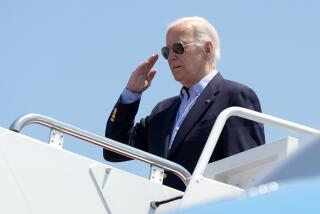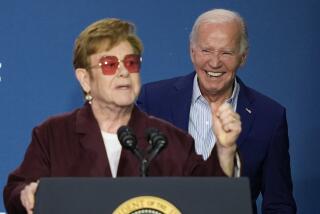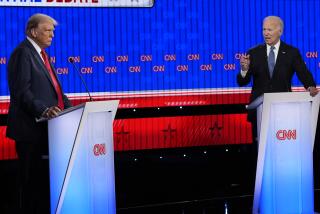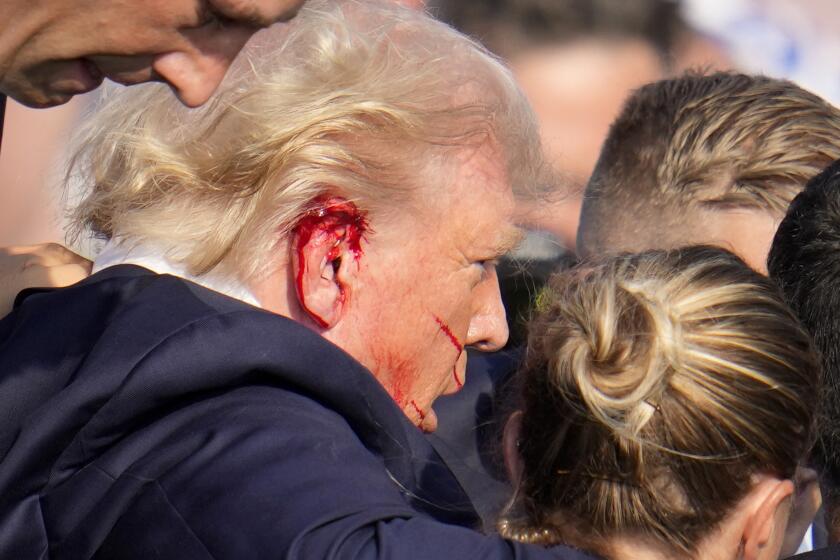Perot Draws Line on Posts for Gays and Adulterers
Adding fuel to the roiling campaign debate over personal values and moral principles, Ross Perot said in a television interview to be aired tonight that he would not place homosexuals in sensitive positions in a prospective presidential Administration and that he would not hire adulterers at all.
“I put a very strong store on strong moral values,” Perot told newswoman Barbara Walters during an hourlong interview with him and his wife, Margot, airing tonight on ABC’s “20/20” program.
Perot, who is expected soon to announce his independent bid for the presidency, was asked by Walters if he would have an acknowledged homosexual on his staff, Perot initially said: “It would all depend. We’d have to be far more specific in what job.”
Pressed on whether he would consider a homosexual for a top Cabinet post, such as the defense, treasury or education departments, Perot said: “No, I don’t want anybody there that will be at a point of controversy with the American people. It will distract from the work to be done.”
Perot drew a distinction between public service and private behavior, saying: “So far as I’m concerned, what people do in their private lives is their business.”
But Perot indicated he would not overturn the existing ban on military service by acknowledged homosexuals, a continuing source of controversy between the federal government and the gay community. Asked about gays serving in the military, he said: “I don’t think that’s realistic.”
Turning to the subject of adultery, Perot said he would “not knowingly” hire someone who had been unfaithful to his wife.
“The American people deserve better than that,” he said.
In other comments during the television interview, Perot criticized Bush’s appointment of Clarence Thomas to the Supreme Court and defended a woman’s right to abortion.
Perot’s remarks about his unwillingness to hire homosexuals for top government jobs drew an angry response from Los Angeles gay leaders when they were told of the comments.
David Mixner, a gay activist who organized a fund-raiser for Bill Clinton in the homosexual community earlier this month, said he was “stunned” by Perot’s comments and predicted they would “become a major issue.”
“It historically has been a pattern of bigots to say you can pick cotton but you can’t eat at the table,” Mixner said. “Bigots have always put limits on how far you can go.”
Steve Weiss, a businessman and board member of Log Cabin L.A., an organization of gay Republicans, said Perot’s remarks suggested a kind of pandering that undermines the independent image he has tried to burnish for his campaign.
“Given the tenor of his campaign--that he’s going to stand up and do what’s right and not play politics--it does seem to belie that,” he said.
The ABC interview provided the most extensive glimpse yet of Perot’s views on social standards and morality, issues that President Bush, Vice President Dan Quayle and presumptive Democratic nominee Clinton all have recently addressed.
It was Quayle who brought the issues to the forefront with a speech in San Francisco earlier this month in which he contended that “a poverty of values” was at the root of the urban crisis that erupted into violence in Los Angeles. He also blamed the television character Murphy Brown for undermining respect for the family by giving birth to a child out of wedlock.
Bush followed those remarks with a speech in which he said his proposals to allow parents greater freedom in choosing schools for their children and to create urban enterprise zones would build individual responsibility and help to strengthen family ties.
Clinton tried to broaden the debate by contending that healthy family relationships demand both respect for traditional values and material security. And it was partly government’s responsibility to help provide that security, he asserted.
Although Perot’s comments concerning homosexuals distance him from Clinton, who has sought gay support, his remarks on the highly sensitive issue of abortion rights place him closer to the views of Clinton than of Bush, who opposes abortion except in the case of rape, incest or where the life of the mother is in danger.
Perot told Walters: “It’s finally the woman’s decision in terms of abortion.”
But Perot also backed the requirement of parental consent for abortions in some cases. Asked about the theoretical situation of a 15-year-old girl seeking an abortion, Perot said: “I think her parents should have a vote in that.”
Perot bluntly expressed his disapproval of the Senate Judiciary Committee’s treatment last fall of law professor Anita Faye Hill when she was called to testify about her accusations of sexual harassment against then-Supreme Court nominee Thomas.
“I thought it was reprehensible,” said Perot. The Republican senators who questioned her credibility “were willing to destroy her for partisan reasons. And I thought it was a sad day for our country and really damaged the credibility of the Senate with the American people.”
As to his views on Thomas, who is black, Perot was careful to contend that race did not influence his judgment. “I would vote for Supreme Court justice without regard to color,” he said. But in Thomas’s case, he said: “I would have urged the President to come forward with a more capable person.”
Times staff writer Ronald Brownstein contributed to this story.
More to Read
Get the L.A. Times Politics newsletter
Deeply reported insights into legislation, politics and policy from Sacramento, Washington and beyond. In your inbox three times per week.
You may occasionally receive promotional content from the Los Angeles Times.






